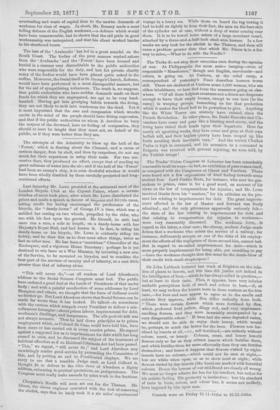Sir John Lubbock lectured last week at Brighton on the
rela- tion of plants to insects, and this time did justice not indeed to the intelligence of bees,—whieh he has always called in question,— but at least to their taste. Flies, it appears, have very inferior anthetic perceptions both of smell and colour to bees,—if, at least, we may reckon the human taste in these matters as the true taste,—for bees and men appear to agree as to the smells and colours they approve, while flies differ radically from both. "There were certain flowers which were fertilised by flies, which preferred livid yellow, dingy red, and very unpleasant- smelling flowers, and they were invariably accompanied by a very disagreeable odour," If bees had the same degraded tastes, we should not be able to enjoy their honey, which would be, perhaps, so much the better for the bees. Flowers not fer-
self-fertilised,—are entirely without tilised by insects at all,
colour, scent, or honey. Colours, scent, and honey benefit flowers only so far as they attract insects which fertilise them, and which fertilise them far more effectually than they can fertilise themselves ; and hence it happens that flowers visited by night- insects have no colours,—which could not be seen at night,— but are white when open, so as to show most at night ; while flowers visited by day-insects (like bees) are marked with beautiful colours. Hence the lessons of our childhood are clearly all wrong. We must no longer admire the bee for his intellect, but rather for his artistic feeling. His geometry is instinctive ; but his standard of taste in form, colour, and odour has, it seems not unlikely, been imposed by him upon man.






























 Previous page
Previous page